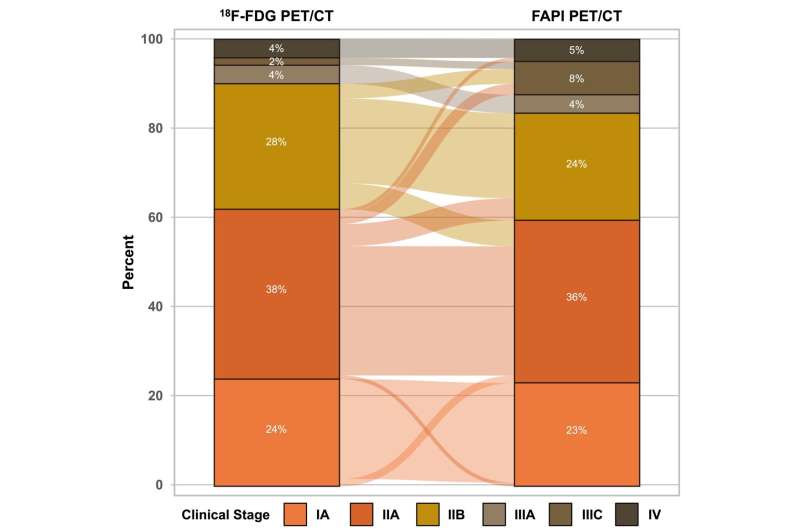This article has been reviewed according to Science X's editorial process and policies. Editors have highlighted the following attributes while ensuring the content's credibility:
fact-checked
peer-reviewed publication
proofread
Comparative analysis shows FAPI PET/CT improves staging of newly diagnosed breast cancer

A comparative analysis between FAPI and 18F-FDG PET/CT for the systemic staging of newly diagnosed breast cancer shows that FAPI PET/CT is more accurate in staging patients. Nearly 20 percent of patients were restaged by FAPI PET/CT, indicating the radiotracer's efficacies and benefits for clinical practice. This research was presented at the 2024 Society of Nuclear Medicine and Molecular Imaging Annual Meeting.
18F-FDG PET/CT, while commonly used in breast cancer staging, has limitations, such as false positives in inflammatory breast lesions and reduced sensitivity in specific breast cancer subtypes. Previous small-sample retrospective studies suggest that 68Ga-FAPI might outperform 18F-FDG PET/CT with its high sensitivity in the detection of primary tumors and metastases among breast cancer patients.
"There is currently a lack of evidence on the efficacy of FAPI PET/CT, especially in large sample cohorts," said Zhixin Hao, MD, a nuclear medicine physician at Peking Union Medical College Hospital in Beijing, China. "Our study sought to add to the literature by assessing FAPI PET/CT for the systemic staging of newly diagnosed breast cancer compared with 18F-FDG PET/CT."
A total of 121 patients newly diagnosed with breast cancer were included in the study. All patients underwent 18F-FDG imaging. In addition, 53 patients were imaged with 68Ga-FAPI-04 PET/CT and 68 patients were imaged with A118F-FAPI-04 PET/CT. Data was analyzed and lesions were recorded as positive if their uptake exceeded that of the adjacent background tissue. The TNM clinical stage was determined from 18F-FDG and FAPI PET/CT, according to the American Joint Committee on Cancer Staging Manual.
Compared to the clinical TNM stage determined by 18F-FDG PET/CT, FAPI re-staged 19.8 percent of patients. Management plans were optimized in six patients due to the additional detection of bone lesions and internal mammary lymph nodes.
Of note, FAPI PET/CT upstaged 21.7 percent of stage IIA patients by 18F-FDG PET/CT. According to Hao, patients with stage IIA BC should be considered for systemic staging with FAPI PET/CT at the time of initial diagnosis.
"This study is significant as it has the potential to advance personalized treatment strategies for breast cancer patients," noted Hao. "FAPI PET/CT for the initial staging of breast cancer has the potential to reduce unnecessary treatments and improve patient outcomes."
More information: Abstract 242411: Hao et al. FAPI Versus 18F-FDG PET/CT for Systemic Staging of Newly Diagnosed Breast Cancer, Journal of Nuclear Medicine (2024).




















